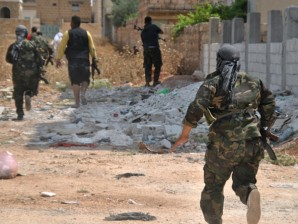Syrian troops massacre more than 200 – rebel leader

In this picture taken on Saturday, June 23, 2012, Syrian rebels run during clashes with Syrian government forces, at Saraqeb town, in the northern province of Idlib, Syria. Investigators say they have concluded that Syrian government troops could be behind the killing of more than 100 civilians in the village of Houla last month. The findings, which were presented to the U.N.'s top human rights body, could lay some of the groundwork for prosecuting alleged crimes against humanity or war crimes in Syria. (AP Photo/Fadi Zaidan)
BEIRUT – Syrian government troops using tanks and helicopters Thursday massacred more than 150 people in the central province of Hama, the Syrian Observatory for Human Rights said, while a rebel leader put the toll at more than 200.
Government troops bombarded the village using tanks and helicopters, according to the Observatory, which earlier put the death toll at more than 100.
Observatory chief Rami Abdel Rahman told AFP by telephone that the bodies of 30 villagers had already been identified following the sustained attack, which brought the day’s total death toll in the conflict-torn nation to over 200.
Rebel leader Abu Mohamad, chief of a group based further to the north, told AFP early Friday that the attack using helicopters, tanks and multiple rocket-launchers had killed more than 200 people in the village.
Abu Mohamad said he had been in phone contact with a resident of Treimsa who told him that government forces were on hills a few kilometres (miles) outside the town.
Article continues after this advertisementThe army and the Shabiha, pro-regime militia who are said to accompany troops to make sure they do not desert, started to bombard Treimsa “Thursday around 11:00 am (0800 GMT) and finished around 9:00 pm,” Abu Mohamad said.
Article continues after this advertisementBut a Hama-based activist who identified himself as Abu Ghazi told AFP via Skype that regime troops started shelling the village earlier, at around 6:00 am.
“That was followed by clashes with the (rebel) Free Syrian Army, but the FSA does not have a big presence in Treimsa and could not fight long,” said the activist.
“The number of martyrs is very high partly because the army shelled a mosque where scores of people had taken shelter, to treat the wounded and hide from the bombs,” Abu Ghazi added.
“But it is obvious that the regime knows no limits. The mosque was shelled, it collapsed, and that killed the people in it.”
The village, which had a population of 7,000, he said, “is empty now. Everyone is dead or has run away.”
The state-run SANA news agency said there had been clashes between the army and an armed “terrorist” group in the village but made no mention of a massacre and gave no overall death toll.
“There were heavy losses among the ranks of the terrorists,” said the report, adding that three government soldiers were killed.
The head of the opposition Syrian National Council, Abdel Basset Sayda, voiced outrage about the latest killings and called for a tough UN resolution that allows for military intervention against the Damascus regime.
“This was a massacre perpetrated by the Syrian regime,” he said, speaking to Al Jazeera TV.
“It is a shame for the UN Security Council and the Arab League.”
“What we want is a clear and straightforward resolution under Chapter VII of the UN Charter which puts all the options on the table, including the use of force. This Syrian regime only understands the language of force.”
Abu Ghazi said that with Idlib in the northwest, Homs in the centre and much of the countryside of Aleppo in the north “out of control, the regime is trying to keep Hama on its side.”
“Hama is in the centre of Syria, and is a link in a chain of provinces where anti-regime feeling is strong; the regime will do anything to keep it controlled.”
The Observatory said more than 17,000 people have been killed since the uprising erupted in mid-March last year.
It is not possible to independently verify death tolls. The United Nations stopped compiling such figures at the end of 2011.